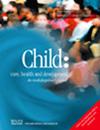Impact of Head Start on Developmental Outcomes for Children of Teenage Mothers
Abstract
Background
This study examined the impact of Head Start on children's outcomes by comparing data from children born to teenage mothers and those born to non-teenage mothers.
Methods
Among the 3592 children in the Head Start Impact Study, 654 were identified as being born to teenage mothers (age 19 or younger). The specific research questions were as follows: (1) Do child and family baseline characteristics differ between children born to teenage mothers and those born to non-teenage mothers within low-income families? (2) Do child outcomes differ between children of teenage mothers and those of non-teenage mothers? (3) Does Head Start participation promote child outcomes, and does this impact differ between children born to teenage mothers and those born to non-teenage mothers?
Results
Children born to teenage mothers were more likely to live in English-speaking households, experience more household risk factors and come from lower income families. They were also less likely to receive preventive dental check-ups compared to children of non-teenage mothers. Furthermore, children of teenage mothers were less likely to identify as Hispanic and more likely to identify as Black. Head Start had a greater impact on the cognitive (higher spelling test scores), social (more positive approach to learning) and health (more dental check-up) outcomes of children born to teenage mothers. The difference in outcomes between Head Start and non–Head Start children was less pronounced for children of non-teenage mothers.
Conclusion
To increase Head Start enrolment among teenage mothers, it is recommended that teenage households be considered as a distinct admission criterion for Head Start enrolment. Furthermore, raising awareness among African American teenage mothers about their eligibility for early intervention programs is essential. Additionally, bilingual programs should be made available and promoted to target Hispanic teenage mothers, ensuring that programs like Head Start are inclusive and accessible to diverse communities.

 求助内容:
求助内容: 应助结果提醒方式:
应助结果提醒方式:


